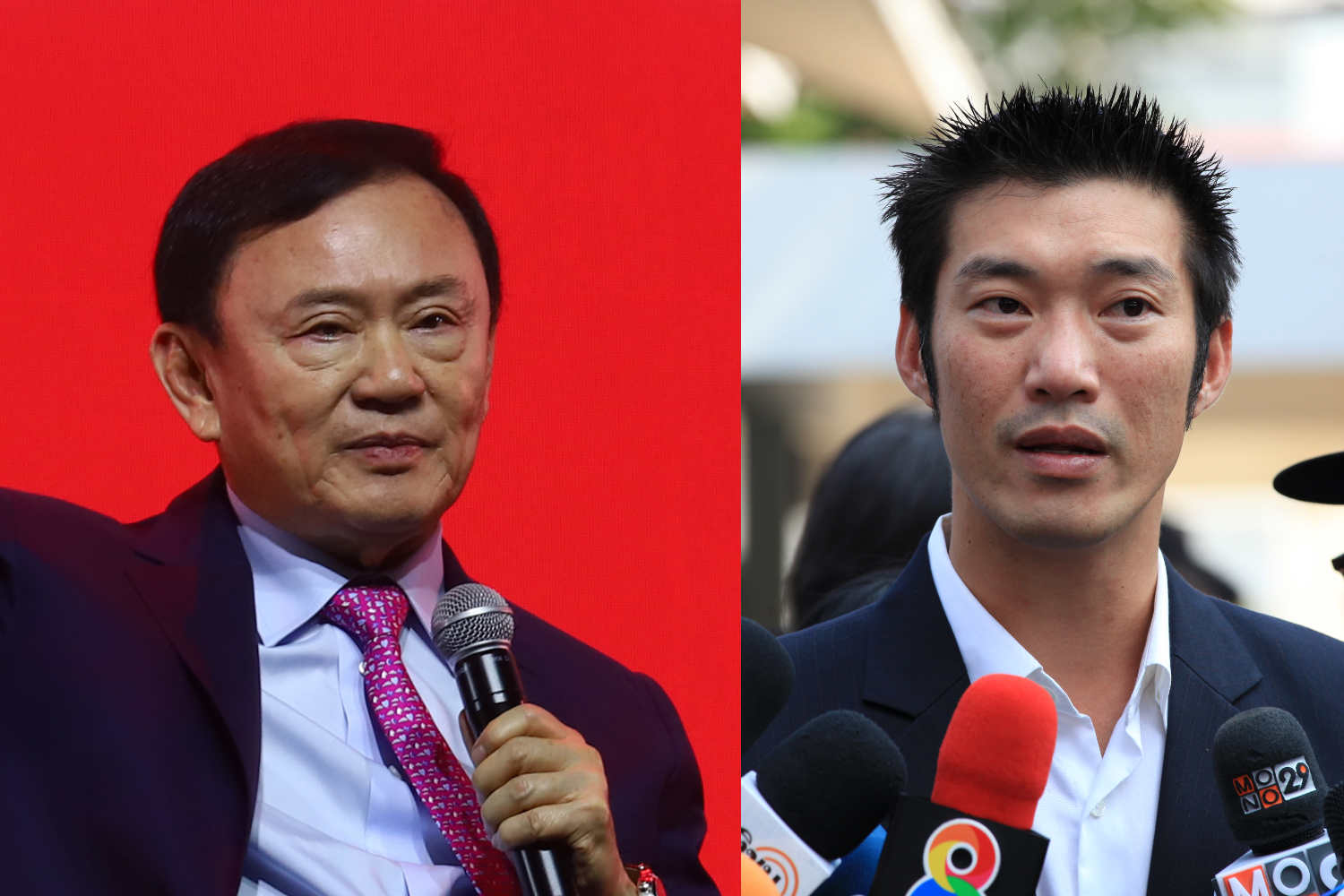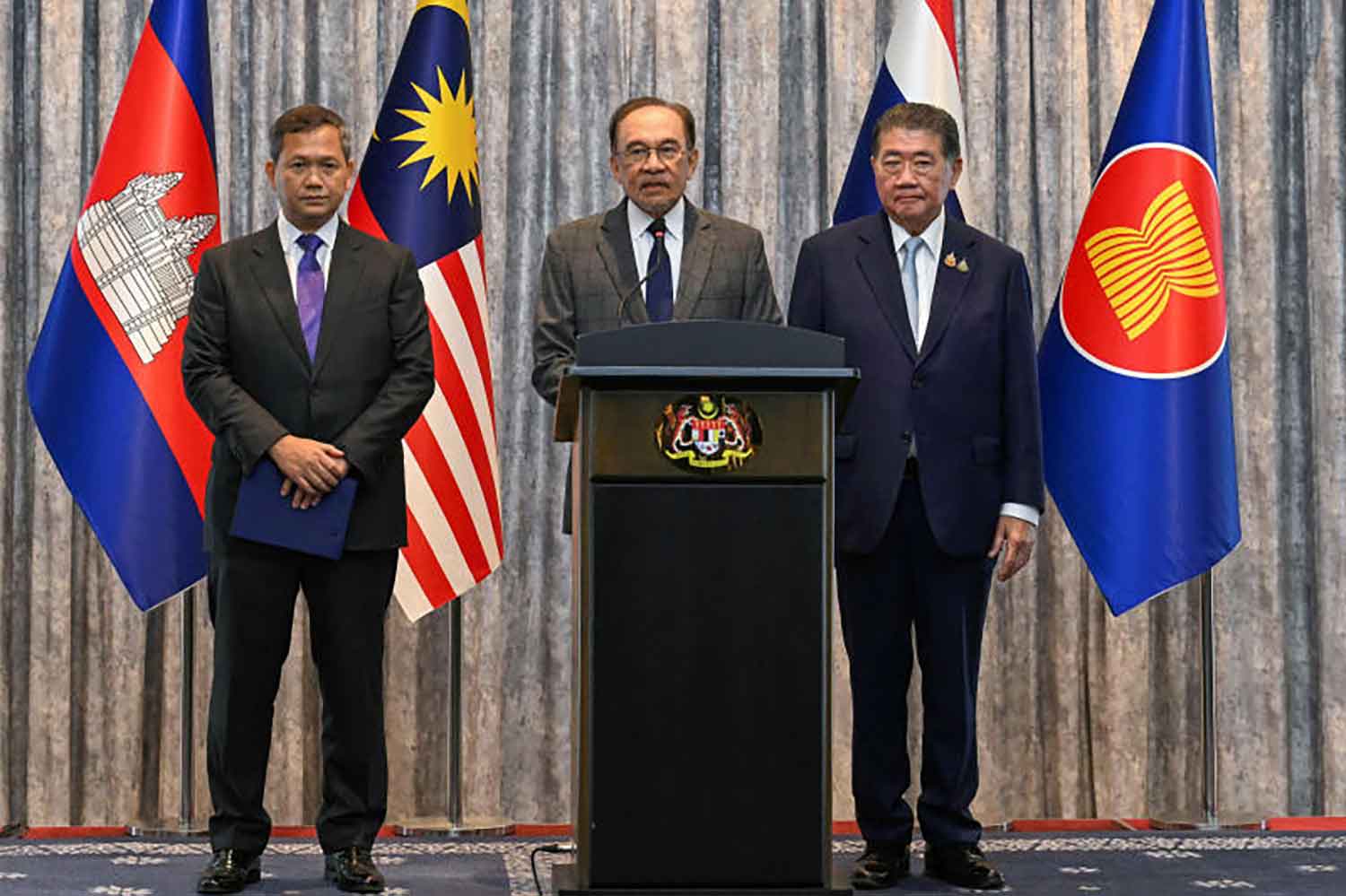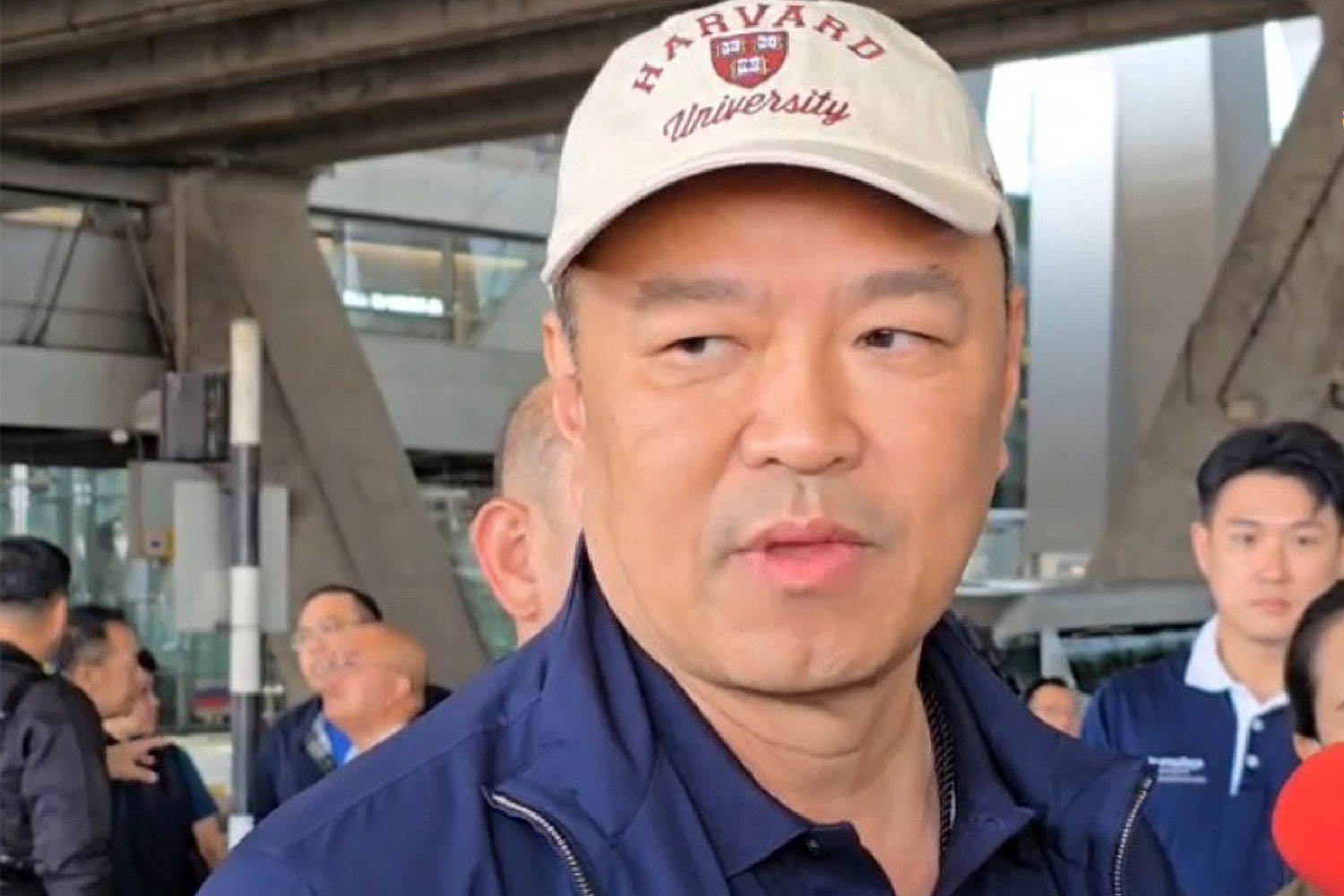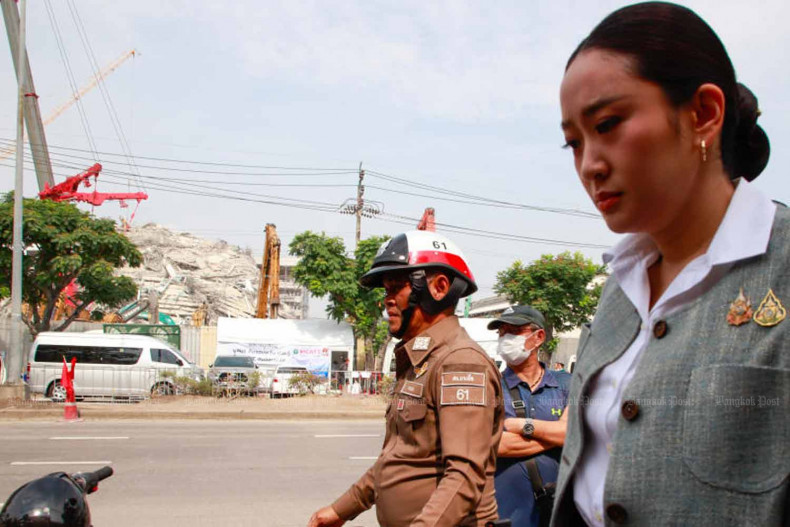Two Thai activists have filed petitions with the Election Commission (EC) urging an official probe into a private meeting between former prime minister Thaksin Shinawatra and Thanathorn Juangroongruangkit, the leader of the Progressive Movement, which took place on Saturday. On Monday, Sonthiya Sawasdee submitted a petition requesting that the EC investigate and pursue legal action against the ruling Pheu Thai Party and the main opposition, the People’s Party (PP). In a separate filing, Srisuwan Janya, who leads the “Love Nation, Love Land” group, made the same request. The petitions allege that Thaksin and Thanathorn—a pair neither of whom sits as a member of Pheu Thai or the PP, with both barred from political rights—exerted influence over government formation discussions. The core claim is that, during the meeting, Thaksin sought to pressure Thanathorn to persuade the PP, with which Thanathorn has ties, to back Pheu Thai’s prime ministerial candidate, Chaikasem Nitisiri, for the top government post. This development follows a wider political moment in which Paetongtarn Shinawatra, Thaksin’s daughter and the leader of Pheu Thai, was stripped of the premiership by the Constitutional Court last Friday over a leaked audio conversation with Hun Sen, the Cambodian Senate President. In the current political theater, Pheu Thai and the Bhumjaithai Party are both courting the PP for support of their respective prime ministerial hopefuls, who must be elected by Parliament, with Bhumjaithai backing its own leader, Anutin Charnvirakul. Against this backdrop, Sonthiya’s assertion that the Thaksin–Thanathorn meeting could breach the organic law on political parties—and potentially furnish grounds for party dissolution—adds a legal dimension to an already tense political landscape. If the PP were to align with Pheu Thai to preserve power, the petitions suggest this would look like the two non-party figures effectively dictating the arrangement, thereby exposing both parties to legal challenge.
Petitioners, Allegations, and Legal Questions
Sonthiya Sawasdee submitted his petition on Monday, asserting that the private meeting between Thaksin Shinawatra and Thanathorn Juangroongruangkit occurred in a manner and at a time that could influence the process by which a government is formed. The petition contends that both Thaksin and Thanathorn are not current members of the two major political forces involved in the present parliamentary dynamics, and moreover, both are barred from political rights. Despite those legal disabilities, the petition argues that their actions and influence in the meeting amount to interference in the political process, specifically the formation of government, which could raise concerns under Thai electoral and party-related law. The core accusation is that Thaksin attempted to lobby Thanathorn to persuade the PP to support Pheu Thai’s preferred prime ministerial candidate, Chaikasem Nitisiri, thereby shaping the outcome of the parliamentary vote.
Srisuwan Janya—leader of the “Love Nation, Love Land” group—filed a separate petition with the same objective: to prompt the EC to investigate and to take legal action against both the ruling party and the opposition party involved in this alleged interference. The shared aim across both petitions is to ensure transparency and accountability in political process or to challenge any actions that might undermine the integrity of party politics or the parliamentary selection of a prime minister. The petitions underscore concerns that the meeting, if proven, could amount to behind-the-scenes manipulation of political alliances that extend beyond ordinary campaigning or lobbying into a form of influence over government formation arrangements.
Crucially, the petitioners emphasize that Thaksin and Thanathorn’s meeting is contested not merely as a private encounter but as a potential infraction of the organic law governing political parties. The organic law is the framework that orchestrates how political parties operate, including the boundaries of acceptable political activity and alignment. The petitions argue that if the PP were to side with Pheu Thai, thereby enabling Pheu Thai to maintain power, this would signal that the two influential figures had effectively dictated the political arrangement. In such a scenario, the petitions suggest, both parties could be exposed to a legal challenge under the organic law, since the integrity of party governance and the independence of political organizations would be at issue. The petitions also imply that the PP’s alignment with Pheu Thai—if established through outside influence from Thaksin and Thanathorn—could constitute a failure to comply with legislative and party governance norms, creating grounds for intervention or dissolution under applicable rules.
The petitions arise within a broader context in which the political environment remains highly sensitive and dynamic. The overarching claim is that private influence from individuals who are not currently holding party membership or official office could affect the official process by which the government is constituted. The EC, as the constitutional referee and administrator of party-related rules, would be responsible for assessing whether there is a breach of the organic law on political parties and for determining any appropriate legal remedies. The petitions therefore position themselves at the intersection of electoral oversight, party governance, and constitutional practice, inviting careful examination of whether informal influence over party coalitions falls within permissible political activity or constitutes unlawful interference.
The Meeting’s Context and Potential Influence on Government Formation
The private meeting between Thaksin Shinawatra and Thanathorn Juangroongruangkit has been framed by the petitioners as potentially consequential for how the next government would be formed. The alleged objective of Thaksin’s outreach, according to the petitions, was to persuade Thanathorn to influence the PP’s stance in favor of Pheu Thai’s prime ministerial candidate, Chaikasem Nitisiri. If the PP were to align with Pheu Thai—essentially molding the parliamentary majority in a way that would secure Chaikasem’s ascent—the two men would be seen as having exercised decisive leverage in a process traditionally determined by elected representatives and formal negotiations among parties. The petitions contend that such influence could undermine the independence and integrity of the parliamentary selection process, thereby triggering scrutiny under the organic law on political parties and raising the possibility of legal consequences for the involved parties if found to be in violation.
This context sits within a broader sequence of political events characterized by shifting alliances and carefully calibrated messaging among major political actors. Paetongtarn Shinawatra’s recent removal from the premiership by the Constitutional Court—rooted in a leaked audio conversation with Cambodian Senate President Hun Sen—added a new layer of complexity to the ongoing discussions about leadership and coalition-building. The timing of the meeting relative to this court decision and the ongoing negotiations among Pheu Thai and other parties underscores the volatility of the political space. The petitions suggest that back-channel discussions and private diplomacy may be playing a decisive role in shaping the fortunes of the political parties involved, which is precisely the kind of activity that constitutional and electoral authorities are designed to monitor and regulate.
The meeting’s alleged aim—coaxing the PP to support Pheu Thai’s candidate—also highlights the delicate balance between party loyalty, external influence, and the integrity of the political process. In a parliamentary system where the prime minister is chosen through a vote by lawmakers, the ability of a coalition to secure sufficient support is essential. If private actors are orchestrating arrangements behind the scenes, the legitimacy of the resulting government could be called into question. The petitions therefore urge the EC to examine whether such private influence constitutes an improper intervention in the democratic process or a transgression of the rules governing party conduct and political collaboration. The potential implications extend beyond the immediate case and touch on the broader issues of transparency, accountability, and the proper boundaries of influence in Thai political life.
Political Landscape: Parties, Leaders, and Historical Footnotes
To understand the significance of the petitions, it helps to map the relevant political landscape and the actors involved. Pheu Thai is the ruling party at the time of the petitions and is closely associated with the Shinawatra family, a powerful political dynasty in Thailand with a track record of influencing national politics across multiple election cycles. Paetongtarn Shinawatra, Thaksin’s daughter, has held leadership roles within Pheu Thai, reinforcing the party’s leadership lineage and its appeal among voters who have longstanding ties to Thaksin’s political base. The party’s pursuit of a prime ministerial candidate reflects broader strategies to assemble a governing coalition capable of sustaining leadership in Parliament.
The PP, or People’s Party, operates as a main opposition force in this snapshot of Thai politics and is depicted as a vehicle for Thanathorn Juangroongruangkit’s political ambitions and networks. Thanathorn’s trajectory has been marked by a series of organizational shifts: he led the Future Forward Party (FFP), which was dissolved for accepting an illegal loan from him. The FFP then re-emerged as the Move Forward Party (MFP), which itself faced dissolution over issues surrounding constitutional reform and attempts to amend lese majeste laws. The MFP eventually reincarnated as the PP, continuing the momentum of Thanathorn’s political project in a new organizational form. This lineage is central to understanding why the PP’s support would be seen as highly consequential by the major parties and by observers attuned to the constitutional and political dynamics of the Thai system.
Bhumjaithai Party, under the leadership of Anutin Charnvirakul, is another key actor in the current political arrangement. Bhumjaithai has its own ambitions for the premiership and has positioned its political capital around its leadership and policy priorities. The party’s stance and its willingness to form coalitions with other parties, including Pheu Thai, are critical elements in the calculation of parliamentary majorities and the broader balance of power in Thai politics. The interplay among Pheu Thai, PP, and Bhumjaithai—and the potential for private influence by non-party actors—constitutes the backdrop against which the EC’s potential intervention would be weighed.
Within this context, the meeting between Thaksin and Thanathorn is not merely a footnote; it is a focal point that brings together historical legacies, contemporary leadership contests, and the practical mechanics of coalition-building. The allegations, if substantiated, would raise questions about the propriety of outside influence in party politics and the boundaries of permissible conduct for individuals who, while not currently holding party membership or political office, retain influence over political outcomes. The petitions thus sit at the intersection of loyalty, legitimacy, and legality in the Thai political system, highlighting tensions between the desire for stable governance and the imperative to uphold transparent, rules-based political competition.
Legal Implications and Potential Outcomes Under Thai Law
The petitions explicitly connect the private meeting to potential violations of the organic law on political parties. This line of reasoning suggests that any conduct by Thaksin and Thanathorn—if found to constitute interfering in government formation or shaping party strategy in a manner outside the permissible conduct prescribed for political actors—could trigger legal consequences under the party-law framework. The organic law on political parties governs how parties organize, how they interact with allied groups, and how they participate in the political process. It provides the authority under which questions of party dissolution or sanctions can be considered if a party is found to be acting in ways that undermine democratic processes or violate the rules of party governance. The petitions therefore present a potential path by which the EC could initiate investigations and, if warranted by evidence and legal standards, pursue appropriate remedies under Thai law.
From a procedural standpoint, the EC’s role would involve assessing whether there is credible evidence of illicit influence or improper coordination that could undermine the integrity of government formation. This would likely entail an examination of communications, context, and any corroborating information that could establish a pattern of conduct inconsistent with party governance norms. The question for the EC would be whether the alleged actions amount to a breach of statutory duties, an attempt to coerce or steer coalition formation, or any conduct that could justify a disciplinary action or even dissolution under the organic law. The potential outcomes could range from formal admonitions and clarifications to more drastic measures should the evidence support a finding of extensive or systemic contravention of party governance rules. The petitions thus place the EC at the center of a high-stakes assessment about the boundaries of legitimate political activity, the independence of parties, and the integrity of the parliamentary process.
Analysts familiar with Thai political law note that actions by individuals who are not currently officeholders or party members can still have meaningful consequences if those actions are shown to influence the functioning of political parties or the formation of coalition governments. The organic law’s emphasis on the proper conduct of political parties and the prevention of subversion or improper influence would be tested in such a scenario. If the EC determines that there is a plausible basis for concern, it could initiate further inquiries, request additional information, or seek to impose penalties consistent with the law’s provisions. On the other hand, if the EC finds insufficient evidence of wrongdoing or a lack of direct causation between the meeting and any concrete legal violation, it may decide not to proceed with formal actions.
The broader legal question also touches on the potential consequences for the PP and Pheu Thai if the allegations gain traction. A finding that a meeting of this type amounted to illegal interference could cast a shadow over the credibility of partnership strategies and parliamentary maneuvers that rely on coalition-building. Such an outcome could influence how lawmakers and political actors approach future negotiations and could affect perceptions of political legitimacy among voters and observers. The legal debate, therefore, is not only about whether a particular encounter occurred, but also about how to interpret the boundaries of permissible political participation and influence within a system that prizes both representative democracy and constitutional order.
Reactions, Analysis, and Next Steps
The petitions signal a proactive effort to use institutional mechanisms to scrutinize actions that could affect the democratic process. While the petitions present a legal case for investigation, the EC will need to assess the evidentiary basis, consider jurisdictional questions, and determine whether there is a sufficient linkage between the alleged private meeting and any actionable breach of party governance rules. Reactions from political actors, observers, and legal experts will likely shape ongoing discourse about the proper role of the EC in policing political conduct and the appropriate remedies if misconduct is identified.
Analysts may view these petitions as part of a broader pattern in Thai politics in which non-party actors seek to influence party alignment and government formation outside of formal processes. The outcome could set a precedent for how similar concerns are addressed in the future, including how the EC weighs privately coordinated efforts against the need to preserve the autonomy of political parties and the legitimacy of parliamentary decisions. The petitions also highlight the fragile balance in a political landscape where court decisions, party realignments, and leadership changes can rapidly alter the dynamics of coalition-building and governance.
In terms of concrete next steps, the EC would likely initiate an initial review to determine whether the petitions warrant a formal investigation. If so, a more detailed fact-finding process could follow, potentially involving document requests, interviews, and cross-examination of relevant stakeholders. Depending on findings, the EC could request further guidance from the relevant authorities, issue official statements clarifying its position, or advance disciplinary or legal proceedings consistent with the organic law on political parties. The timeline for any such process would depend on the EC’s procedures, the availability of evidence, and the complexity of the political questions involved. In the interim, the political dialogue and coalition discussions are likely to be influenced by ongoing public discourse about the legitimacy and propriety of private influence on government formation.
Timeline and Chronology of Recent Events
On Saturday, the private meeting between Thaksin Shinawatra and Thanathorn Juangroongruangkit reportedly occurred, prompting scrutiny and concern among political observers and activists. The nature and content of the meeting, as described by the petitioners, centered on Thaksin’s alleged attempt to lobby Thanathorn to persuade the PP to back Pheu Thai’s prime ministerial candidate, Chaikasem Nitisiri. The private aspect of the meeting—and the alleged goal of shaping parliamentary support—provides the focal point for the petitions that would later be filed with the EC.
The following Monday, Sonthiya Sawasdee submitted his petition to urge an EC investigation and potential legal action against Pheu Thai and the PP. The petition emphasizes the potential breach of party governance rules and the implications for the integrity of the political process. The petitions are thus tied together through the common claim that the meeting could influence the government formation process and that such influence, if proven, would warrant a formal response under Thai law.
The contemporary political environment has already been shaped by a significant development: Paetongtarn Shinawatra’s recent removal from the premiership by the Constitutional Court, following the leakage of an audio conversation with Hun Sen. This court decision added a new layer of complexity to the ongoing negotiations among major political players and their leadership teams. The convergence of a court decision, back-channel diplomacy, and opposition coordination underscores how quickly political configurations can shift in Thailand, and how legal and institutional mechanisms become central to resolving questions about governance and legitimacy.
In this context, the petitions allege that Pheu Thai and the PP are seeking to align their positions in ways that could alter the balance of power within Parliament. The political strategy of pursuing coalition support through a combination of party alignment and back-channel influence is a theme that recurs in many Thai political episodes, and the present case is no exception. The petitioners argue that such a strategy, if conducted through improper influence or outside the bounds of party governance norms, should be subject to oversight and possible sanction. The EC’s response to these petitions will thus be watched closely as a test of how Thai institutions handle allegations of external influence in the political process.
Conclusion
The petitions filed by Sonthiya Sawasdee and Srisuwan Janya bring into sharp relief questions about the boundaries between private influence and formal political process in Thailand. The alleged private meeting between Thaksin Shinawatra and Thanathorn Juangroongruangkit centers on claims that they sought to shape government formation by pressuring the PP to back Pheu Thai’s prime ministerial candidate, Chaikasem Nitisiri. The petitions argue that such conduct could breach the organic law on political parties, opening the door to potential legal consequences for the involved parties if validated by evidence and due process. The case sits at the intersection of electoral oversight, party governance, and constitutional norms, and it follows closely on the heels of the Constitutional Court’s decision affecting Paetongtarn Shinawatra’s premiership, underscoring a moment of heightened political sensitivity and scrutiny.
As the Election Commission considers whether to initiate formal investigations, the Thai political community will watch closely how the EC interprets the boundaries of permissible political activity and influence within a party-driven, parliamentary system. The outcome could have meaningful implications for party dynamics, coalition-building strategies, and the perception of governance legitimacy in Thailand. The broader question remains how Thai institutions balance the need for decisive leadership with the imperative to uphold transparent, rules-based political competition in a volatile and highly interconnected political landscape. The ongoing developments will continue to shape the trajectory of Pheu Thai, the PP, and their respective allies, as well as the role of non-party actors in influencing the democratic process.





